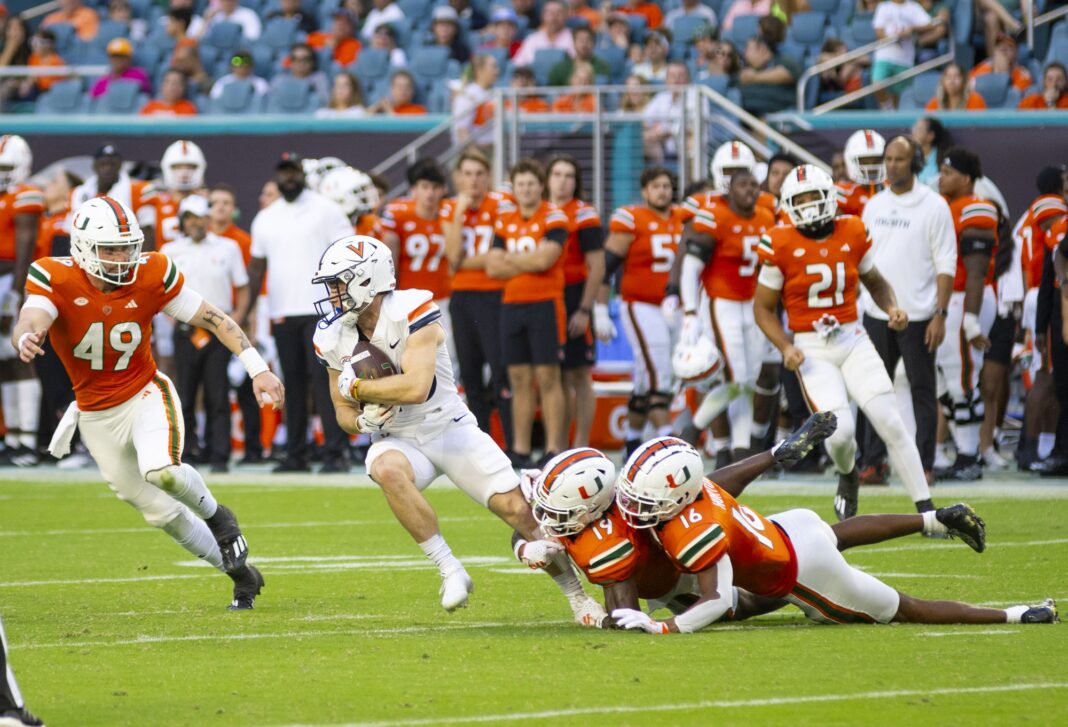
Another week, another overtime touchdown run and another nail-biting win for the Miami Hurricanes. Miami’s formula for its win against Clemson remained virtually identical against Virginia: the ‘Canes struggled to get anything going in the first half against the Cavaliers, but, much like the week before, they recovered in the second half, forced overtime, and emerged victorious.
The 29-26 win moved Miami to 2-2 in the ACC, and by crossing the 6-win mark overall, the team became bowl game-eligible for the first time since 2021.
But the game was far from perfect, and with a crucial road trip ahead for the ‘Canes, there’s plenty of room to improve. Let’s dive into some takeaways, both good and bad, from Miami’s win on Saturday.
Miami’s diverse run game continued to shine.
Running backs Ajay Allen and Mark Fletcher Jr. were the stars of the show, combining for 114 yards and two touchdowns on only 22 carries. Allen gave Miami its first touchdown of the game on a gritty, SportsCenter-worthy 26-yard run in the third quarter.
But with the game on the line in overtime, head coach Mario Cristobal turned to Fletcher on three straight carries, and the freshman back rewarded his coach’s trust with an 11-yard scamper into the endzone to win the game.
“Fletcher runs really hard,” remarked Cristobal. “He has the complete trust of the entire organization.”
Miami’s run game, one of the best in the ACC, doesn’t rely on a single lead back. In fact, only one back surpassed the 20-carry mark in a game this season: Donald Chaney Jr. ran the ball 24 times in the loss to Georgia Tech. Offensive coordinator Shannon Dawson has trusted the hot hand all season with his running backs, and the strategy has paid dividends.
Tyler Van Dyke’s post-bye woes continued.
Van Dyke returned to the field after a one-week absence but struggled mightily against the Cavaliers’ defense. Van Dyke threw for a meager 163 yards — his lowest mark of the year — while throwing two interceptions and failing to record a passing touchdown. Since starting ACC play, the junior signal-caller has caught the turnover bug, throwing seven interceptions in his last three starts.
This high turnover rate is uncharted territory for Van Dyke, who threw five interceptions last season and six in his 2021ACC Rookie of the Year campaign.
“I just gotta make better decisions,” the quarterback admitted. “Just gotta go back to the drawing board and prepare better.”
Van Dyke’s passing woes were especially prevalent when targeting wide receiver Xavier Restrepo. His first interception of the day was on an underthrown 26-yard pass to Restrepo down the left sideline. Later, on a crucial fourth-quarter third down play, Van Dyke once again forced the ball to Restrepo, this time in double coverage, and it resulted in an incomplete pass.
The Van Dyke-Restrepo connection is objectively a good thing. The quarterback and receiver have immense chemistry, which often leads to reliable yardage as well as big plays. But Van Dyke used his favorite receiver as a crutch against the Cavaliers, forcing throws to him in unfavorable situations despite the availability of other quality targets. Van Dyke’s struggles can be pinned on several factors, but when quality receivers like Colbie Young and Jacolby George are on the field, the signal-caller needs to start placing trust in receivers who aren’t his roommate.
The pass rush maintained its hot streak, but the run defense faltered in big moments.
Miami’s pass rush continued its hot streak, recording five sacks for the third straight game. Defensive tackle Brandon Deen recorded two sacks and linebacker Francisco Mauigoa notched 1.5. But, once again, freshman defensive lineman Reuben Bain Jr. was the star of the show. He tied for the team lead with two sacks and made his presence felt nearly every time Virginia quarterback Tony Muskett dropped back.
The pass rush’s impact on Virginia’s passing offense was evident early on. Following a drive in which Bain recorded a sack and a quarterback hit on back-to-back plays, Muskett started getting the ball out quickly as the Cavaliers’ receivers opted for shorter, faster-developing routes. Though this proved effective for shorter gains, the ‘Canes continued to get pressure in longer-yardage situations when the Cavaliers were forced to opt for deeper routes.
Much like the pass rush, Miami’s run defense was coming off a strong game against Clemson, holding the Tigers to 31 total yards on the ground at under one yard per carry. However, the ‘Canes failed to repeat that performance on Saturday, allowing the Cavaliers to tally 138 rushing yards. Running backs Perris Jones and Mike Hollins accounted for the bulk of Virginia’s rushing production, amassing a combined 107 yards. Jones averaged over six yards per carry, while Hollins hammered in two touchdowns with ease.
Miami’s run defense wasn’t entirely terrible: it held Muskett to only six yards, a miniscule tally compared to the 66 yards he compiled against North Carolina a week earlier. But considering the team’s hot start against the run — Miami held its first five opponents to under 100 rushing yards — allowing 100-plus yards in two out of its last three games is a cause for concern.
With four games left, the ‘Canes’ run defense will need to step up. Preventing upcoming ranked opponents — namely No. 4 Florida State and No. 15 Louisville — from controlling game flow will start with a stout run defense. Furthermore, Boston College, the Hurricanes’ final opponent of the season, ranks tenth in the nation in rush yards per game. Miami will need to return to employing a strong defensive front if it wants to stay afloat in the ACC.





